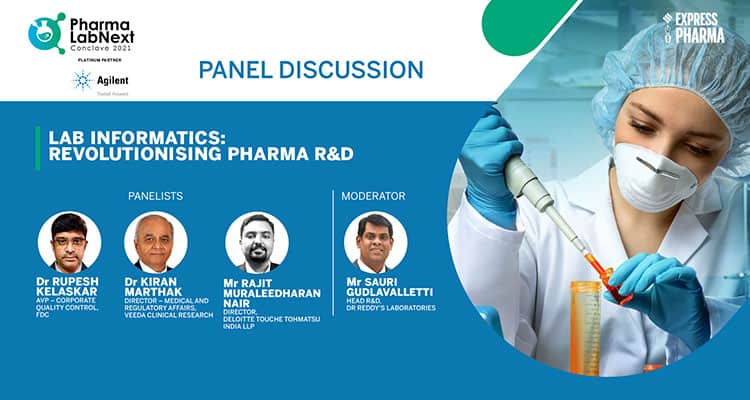The pharma industry is continuously striving to become more efficient and cost-effective to deal with existing and emerging diseases. And, laboratory operations have a significant role to play in the success of these endeavours by the pharma sector. As a result, the industry is increasingly relying on lab informatics to gain actionable insights and get decision support to improve the effectiveness and efficacy of their R&D efforts. Therefore, the fourth and the final panel discussion at Pharma LabNext Conclave focused on the advancements in lab information technologies to meet the demands of the pharma sector, factors spurring their adoption, challenges in implementation and more.
Moderated by Sauri Gudlavalletti, Head R&D, Dr Reddy’s Laboratories, the expert panel for this discussion comprised Dr Kiran Marthak, Director – Medical and Regulatory Affairs, Veeda Clinical Research; Dr Rupesh Kelaskar, AVP – Corporate Quality Control, FDC and Rajit Muraleedharan Nair, Director, Deloitte Touche Tohmatsu India LLP.
The moderator set the context for the discussion by giving an overview about the lab informatics market. He informed that as per reports, this industry was set to grow at a CAGR of 10.8 per cent to touch $5.6 billion by 2026. He stated that lab informatics is growing rapidly due to drivers like rising R&D expenditure, emerging integrated solutions, and the need for better documentation to enable regulatory compliance. He also said that hindrances to the growth of this industry include high maintenance and service costs, interfacing with diverse lab equipment, lack of integration standards for LIMS, dearth of trained professionals and interoperability challenges.

Dr Kelaskar spoke on how lab informatics solutions such as LIMS and chromatographic software and electronic notebooks have been adopted and implemented in his organisation to improve the way data is collected, stored and analysed. This, in turn has helped improve data integrity and documentation standards.
Dr Marthak gave his take on how lab informatics not only improves lab operations but also enables better efficiency to clinical research. The data generated from these operations can be vital in reducing errors, ushering cost and time optimisation, accelerating productivity, and improving R&D outcomes.
Nair informed that the entire lab informatics landscape is becoming more integrated and agile. As newer solutions enter the market, international bodies are trying to bring in standardisation in this field. This, in turn, is making data more findable, accessible, interoperable and reusable. Now, the data is minable and this helps to capture real-time information about all the processes and operations. Lab informatics is also enabling faster and safer data exchange which will be crucial as collaborations in the pharma R&D space increase.
The discussion concluded with the inference that digitalisation and automation of labs, accelerated as a result of COVID-19, will be key to improving outputs and innovation in the sector.
Back to Pharma labs: The next frontier
- Advertisement -


